Short and Long Term Effects of Poor Nutrition on Child Development
VerifiedAdded on 2023/06/05
|8
|2240
|280
AI Summary
This article discusses the short and long term effects of poor nutrition on child development. It covers the impact of poor nutrition on cognitive, physical, and mental development, including issues such as tooth decay, heart disease, obesity, and anaemia. The article also highlights the importance of a balanced diet for children and the risks associated with a diet lacking in essential nutrients. Course code and college/university not mentioned.
Contribute Materials
Your contribution can guide someone’s learning journey. Share your
documents today.

Award in Childcare and
Education Assignment 11
Education Assignment 11
Secure Best Marks with AI Grader
Need help grading? Try our AI Grader for instant feedback on your assignments.

Contents
Contents...........................................................................................................................................2
SHORT TERM EFFECTS..............................................................................................................1
LONG TERM EFFECTS................................................................................................................3
REFERENCES................................................................................................................................6
Contents...........................................................................................................................................2
SHORT TERM EFFECTS..............................................................................................................1
LONG TERM EFFECTS................................................................................................................3
REFERENCES................................................................................................................................6
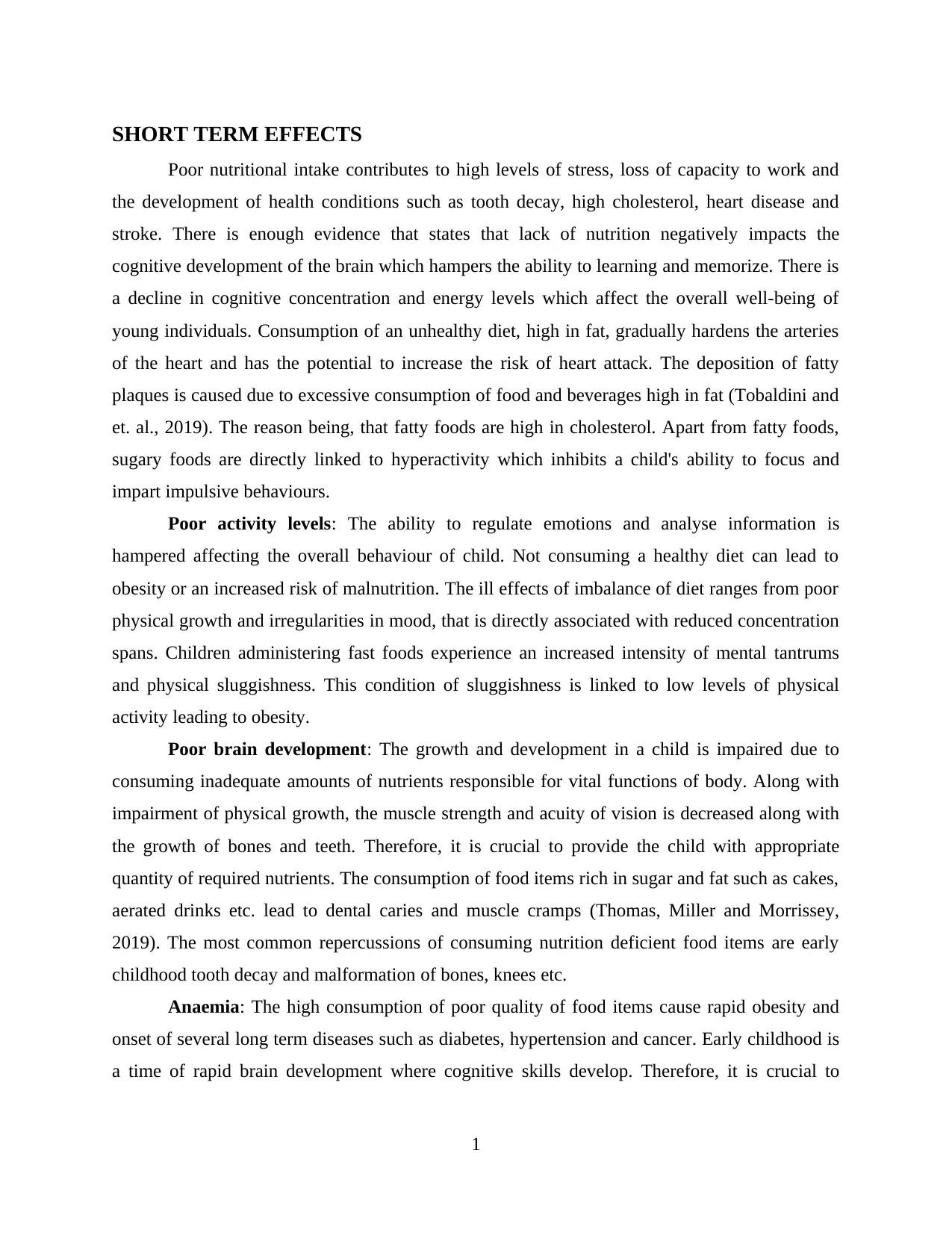
SHORT TERM EFFECTS
Poor nutritional intake contributes to high levels of stress, loss of capacity to work and
the development of health conditions such as tooth decay, high cholesterol, heart disease and
stroke. There is enough evidence that states that lack of nutrition negatively impacts the
cognitive development of the brain which hampers the ability to learning and memorize. There is
a decline in cognitive concentration and energy levels which affect the overall well-being of
young individuals. Consumption of an unhealthy diet, high in fat, gradually hardens the arteries
of the heart and has the potential to increase the risk of heart attack. The deposition of fatty
plaques is caused due to excessive consumption of food and beverages high in fat (Tobaldini and
et. al., 2019). The reason being, that fatty foods are high in cholesterol. Apart from fatty foods,
sugary foods are directly linked to hyperactivity which inhibits a child's ability to focus and
impart impulsive behaviours.
Poor activity levels: The ability to regulate emotions and analyse information is
hampered affecting the overall behaviour of child. Not consuming a healthy diet can lead to
obesity or an increased risk of malnutrition. The ill effects of imbalance of diet ranges from poor
physical growth and irregularities in mood, that is directly associated with reduced concentration
spans. Children administering fast foods experience an increased intensity of mental tantrums
and physical sluggishness. This condition of sluggishness is linked to low levels of physical
activity leading to obesity.
Poor brain development: The growth and development in a child is impaired due to
consuming inadequate amounts of nutrients responsible for vital functions of body. Along with
impairment of physical growth, the muscle strength and acuity of vision is decreased along with
the growth of bones and teeth. Therefore, it is crucial to provide the child with appropriate
quantity of required nutrients. The consumption of food items rich in sugar and fat such as cakes,
aerated drinks etc. lead to dental caries and muscle cramps (Thomas, Miller and Morrissey,
2019). The most common repercussions of consuming nutrition deficient food items are early
childhood tooth decay and malformation of bones, knees etc.
Anaemia: The high consumption of poor quality of food items cause rapid obesity and
onset of several long term diseases such as diabetes, hypertension and cancer. Early childhood is
a time of rapid brain development where cognitive skills develop. Therefore, it is crucial to
1
Poor nutritional intake contributes to high levels of stress, loss of capacity to work and
the development of health conditions such as tooth decay, high cholesterol, heart disease and
stroke. There is enough evidence that states that lack of nutrition negatively impacts the
cognitive development of the brain which hampers the ability to learning and memorize. There is
a decline in cognitive concentration and energy levels which affect the overall well-being of
young individuals. Consumption of an unhealthy diet, high in fat, gradually hardens the arteries
of the heart and has the potential to increase the risk of heart attack. The deposition of fatty
plaques is caused due to excessive consumption of food and beverages high in fat (Tobaldini and
et. al., 2019). The reason being, that fatty foods are high in cholesterol. Apart from fatty foods,
sugary foods are directly linked to hyperactivity which inhibits a child's ability to focus and
impart impulsive behaviours.
Poor activity levels: The ability to regulate emotions and analyse information is
hampered affecting the overall behaviour of child. Not consuming a healthy diet can lead to
obesity or an increased risk of malnutrition. The ill effects of imbalance of diet ranges from poor
physical growth and irregularities in mood, that is directly associated with reduced concentration
spans. Children administering fast foods experience an increased intensity of mental tantrums
and physical sluggishness. This condition of sluggishness is linked to low levels of physical
activity leading to obesity.
Poor brain development: The growth and development in a child is impaired due to
consuming inadequate amounts of nutrients responsible for vital functions of body. Along with
impairment of physical growth, the muscle strength and acuity of vision is decreased along with
the growth of bones and teeth. Therefore, it is crucial to provide the child with appropriate
quantity of required nutrients. The consumption of food items rich in sugar and fat such as cakes,
aerated drinks etc. lead to dental caries and muscle cramps (Thomas, Miller and Morrissey,
2019). The most common repercussions of consuming nutrition deficient food items are early
childhood tooth decay and malformation of bones, knees etc.
Anaemia: The high consumption of poor quality of food items cause rapid obesity and
onset of several long term diseases such as diabetes, hypertension and cancer. Early childhood is
a time of rapid brain development where cognitive skills develop. Therefore, it is crucial to
1
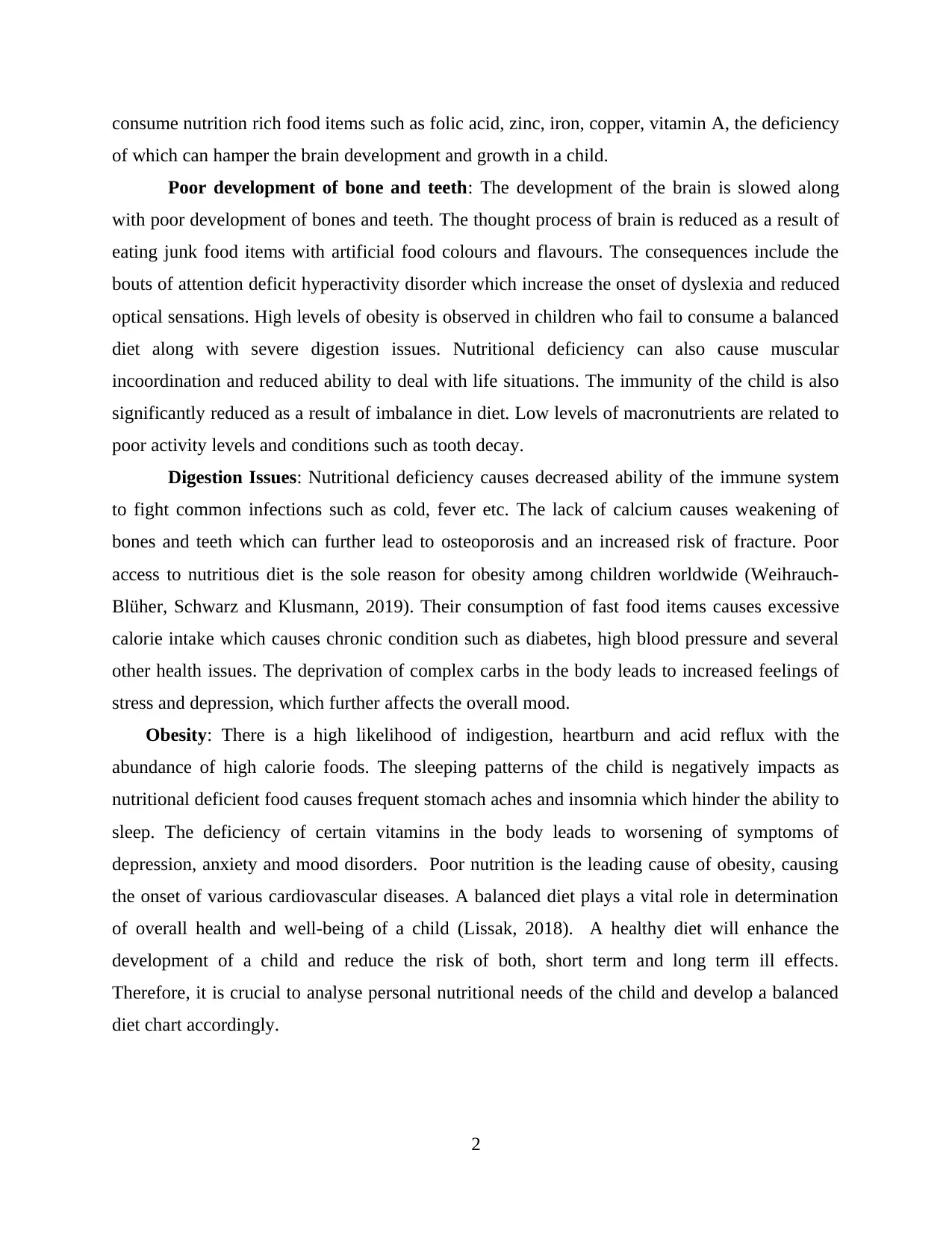
consume nutrition rich food items such as folic acid, zinc, iron, copper, vitamin A, the deficiency
of which can hamper the brain development and growth in a child.
Poor development of bone and teeth: The development of the brain is slowed along
with poor development of bones and teeth. The thought process of brain is reduced as a result of
eating junk food items with artificial food colours and flavours. The consequences include the
bouts of attention deficit hyperactivity disorder which increase the onset of dyslexia and reduced
optical sensations. High levels of obesity is observed in children who fail to consume a balanced
diet along with severe digestion issues. Nutritional deficiency can also cause muscular
incoordination and reduced ability to deal with life situations. The immunity of the child is also
significantly reduced as a result of imbalance in diet. Low levels of macronutrients are related to
poor activity levels and conditions such as tooth decay.
Digestion Issues: Nutritional deficiency causes decreased ability of the immune system
to fight common infections such as cold, fever etc. The lack of calcium causes weakening of
bones and teeth which can further lead to osteoporosis and an increased risk of fracture. Poor
access to nutritious diet is the sole reason for obesity among children worldwide (Weihrauch-
Blüher, Schwarz and Klusmann, 2019). Their consumption of fast food items causes excessive
calorie intake which causes chronic condition such as diabetes, high blood pressure and several
other health issues. The deprivation of complex carbs in the body leads to increased feelings of
stress and depression, which further affects the overall mood.
Obesity: There is a high likelihood of indigestion, heartburn and acid reflux with the
abundance of high calorie foods. The sleeping patterns of the child is negatively impacts as
nutritional deficient food causes frequent stomach aches and insomnia which hinder the ability to
sleep. The deficiency of certain vitamins in the body leads to worsening of symptoms of
depression, anxiety and mood disorders. Poor nutrition is the leading cause of obesity, causing
the onset of various cardiovascular diseases. A balanced diet plays a vital role in determination
of overall health and well-being of a child (Lissak, 2018). A healthy diet will enhance the
development of a child and reduce the risk of both, short term and long term ill effects.
Therefore, it is crucial to analyse personal nutritional needs of the child and develop a balanced
diet chart accordingly.
2
of which can hamper the brain development and growth in a child.
Poor development of bone and teeth: The development of the brain is slowed along
with poor development of bones and teeth. The thought process of brain is reduced as a result of
eating junk food items with artificial food colours and flavours. The consequences include the
bouts of attention deficit hyperactivity disorder which increase the onset of dyslexia and reduced
optical sensations. High levels of obesity is observed in children who fail to consume a balanced
diet along with severe digestion issues. Nutritional deficiency can also cause muscular
incoordination and reduced ability to deal with life situations. The immunity of the child is also
significantly reduced as a result of imbalance in diet. Low levels of macronutrients are related to
poor activity levels and conditions such as tooth decay.
Digestion Issues: Nutritional deficiency causes decreased ability of the immune system
to fight common infections such as cold, fever etc. The lack of calcium causes weakening of
bones and teeth which can further lead to osteoporosis and an increased risk of fracture. Poor
access to nutritious diet is the sole reason for obesity among children worldwide (Weihrauch-
Blüher, Schwarz and Klusmann, 2019). Their consumption of fast food items causes excessive
calorie intake which causes chronic condition such as diabetes, high blood pressure and several
other health issues. The deprivation of complex carbs in the body leads to increased feelings of
stress and depression, which further affects the overall mood.
Obesity: There is a high likelihood of indigestion, heartburn and acid reflux with the
abundance of high calorie foods. The sleeping patterns of the child is negatively impacts as
nutritional deficient food causes frequent stomach aches and insomnia which hinder the ability to
sleep. The deficiency of certain vitamins in the body leads to worsening of symptoms of
depression, anxiety and mood disorders. Poor nutrition is the leading cause of obesity, causing
the onset of various cardiovascular diseases. A balanced diet plays a vital role in determination
of overall health and well-being of a child (Lissak, 2018). A healthy diet will enhance the
development of a child and reduce the risk of both, short term and long term ill effects.
Therefore, it is crucial to analyse personal nutritional needs of the child and develop a balanced
diet chart accordingly.
2
Secure Best Marks with AI Grader
Need help grading? Try our AI Grader for instant feedback on your assignments.
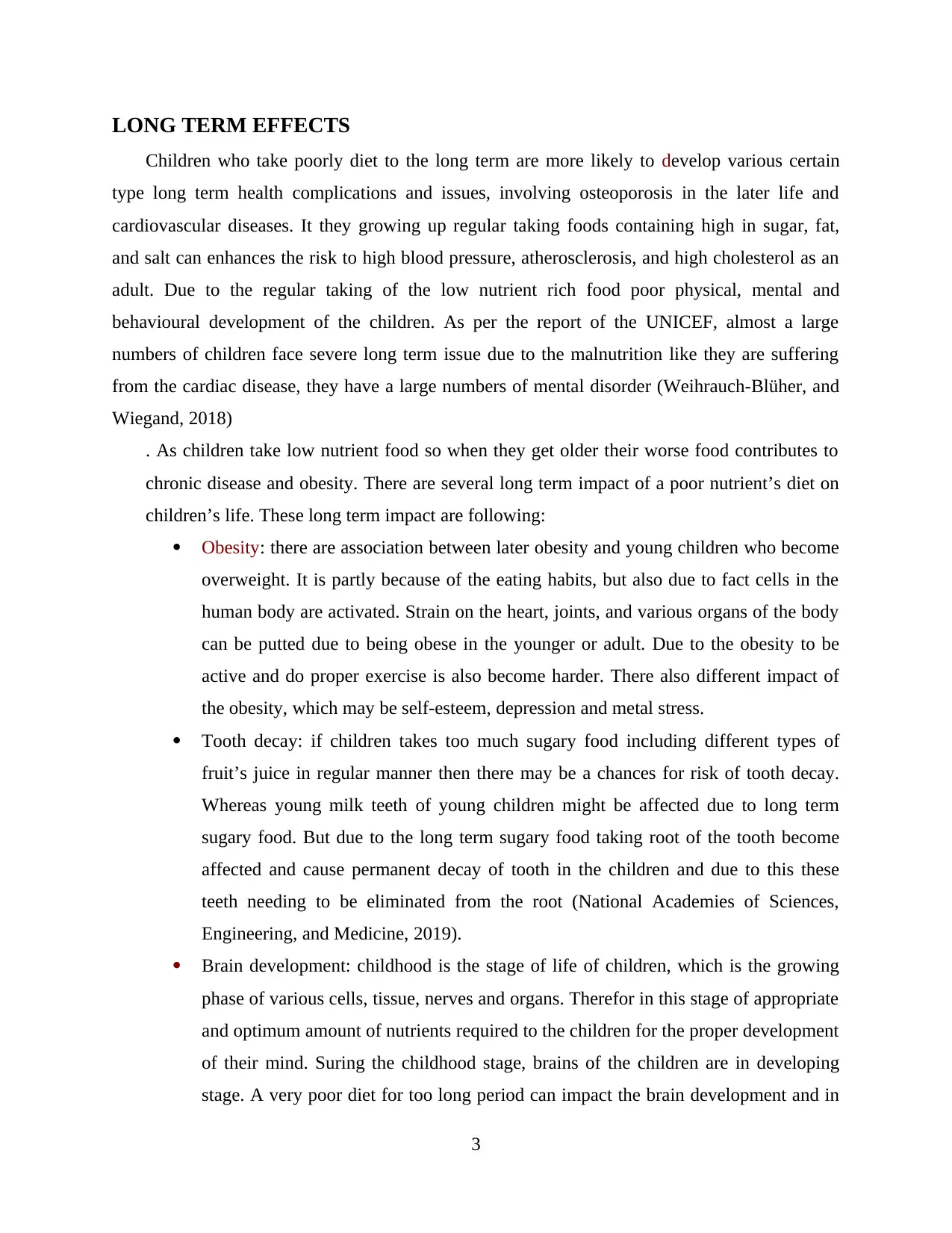
LONG TERM EFFECTS
Children who take poorly diet to the long term are more likely to develop various certain
type long term health complications and issues, involving osteoporosis in the later life and
cardiovascular diseases. It they growing up regular taking foods containing high in sugar, fat,
and salt can enhances the risk to high blood pressure, atherosclerosis, and high cholesterol as an
adult. Due to the regular taking of the low nutrient rich food poor physical, mental and
behavioural development of the children. As per the report of the UNICEF, almost a large
numbers of children face severe long term issue due to the malnutrition like they are suffering
from the cardiac disease, they have a large numbers of mental disorder (Weihrauch-Blüher, and
Wiegand, 2018)
. As children take low nutrient food so when they get older their worse food contributes to
chronic disease and obesity. There are several long term impact of a poor nutrient’s diet on
children’s life. These long term impact are following:
Obesity: there are association between later obesity and young children who become
overweight. It is partly because of the eating habits, but also due to fact cells in the
human body are activated. Strain on the heart, joints, and various organs of the body
can be putted due to being obese in the younger or adult. Due to the obesity to be
active and do proper exercise is also become harder. There also different impact of
the obesity, which may be self-esteem, depression and metal stress.
Tooth decay: if children takes too much sugary food including different types of
fruit’s juice in regular manner then there may be a chances for risk of tooth decay.
Whereas young milk teeth of young children might be affected due to long term
sugary food. But due to the long term sugary food taking root of the tooth become
affected and cause permanent decay of tooth in the children and due to this these
teeth needing to be eliminated from the root (National Academies of Sciences,
Engineering, and Medicine, 2019).
Brain development: childhood is the stage of life of children, which is the growing
phase of various cells, tissue, nerves and organs. Therefor in this stage of appropriate
and optimum amount of nutrients required to the children for the proper development
of their mind. Suring the childhood stage, brains of the children are in developing
stage. A very poor diet for too long period can impact the brain development and in
3
Children who take poorly diet to the long term are more likely to develop various certain
type long term health complications and issues, involving osteoporosis in the later life and
cardiovascular diseases. It they growing up regular taking foods containing high in sugar, fat,
and salt can enhances the risk to high blood pressure, atherosclerosis, and high cholesterol as an
adult. Due to the regular taking of the low nutrient rich food poor physical, mental and
behavioural development of the children. As per the report of the UNICEF, almost a large
numbers of children face severe long term issue due to the malnutrition like they are suffering
from the cardiac disease, they have a large numbers of mental disorder (Weihrauch-Blüher, and
Wiegand, 2018)
. As children take low nutrient food so when they get older their worse food contributes to
chronic disease and obesity. There are several long term impact of a poor nutrient’s diet on
children’s life. These long term impact are following:
Obesity: there are association between later obesity and young children who become
overweight. It is partly because of the eating habits, but also due to fact cells in the
human body are activated. Strain on the heart, joints, and various organs of the body
can be putted due to being obese in the younger or adult. Due to the obesity to be
active and do proper exercise is also become harder. There also different impact of
the obesity, which may be self-esteem, depression and metal stress.
Tooth decay: if children takes too much sugary food including different types of
fruit’s juice in regular manner then there may be a chances for risk of tooth decay.
Whereas young milk teeth of young children might be affected due to long term
sugary food. But due to the long term sugary food taking root of the tooth become
affected and cause permanent decay of tooth in the children and due to this these
teeth needing to be eliminated from the root (National Academies of Sciences,
Engineering, and Medicine, 2019).
Brain development: childhood is the stage of life of children, which is the growing
phase of various cells, tissue, nerves and organs. Therefor in this stage of appropriate
and optimum amount of nutrients required to the children for the proper development
of their mind. Suring the childhood stage, brains of the children are in developing
stage. A very poor diet for too long period can impact the brain development and in
3
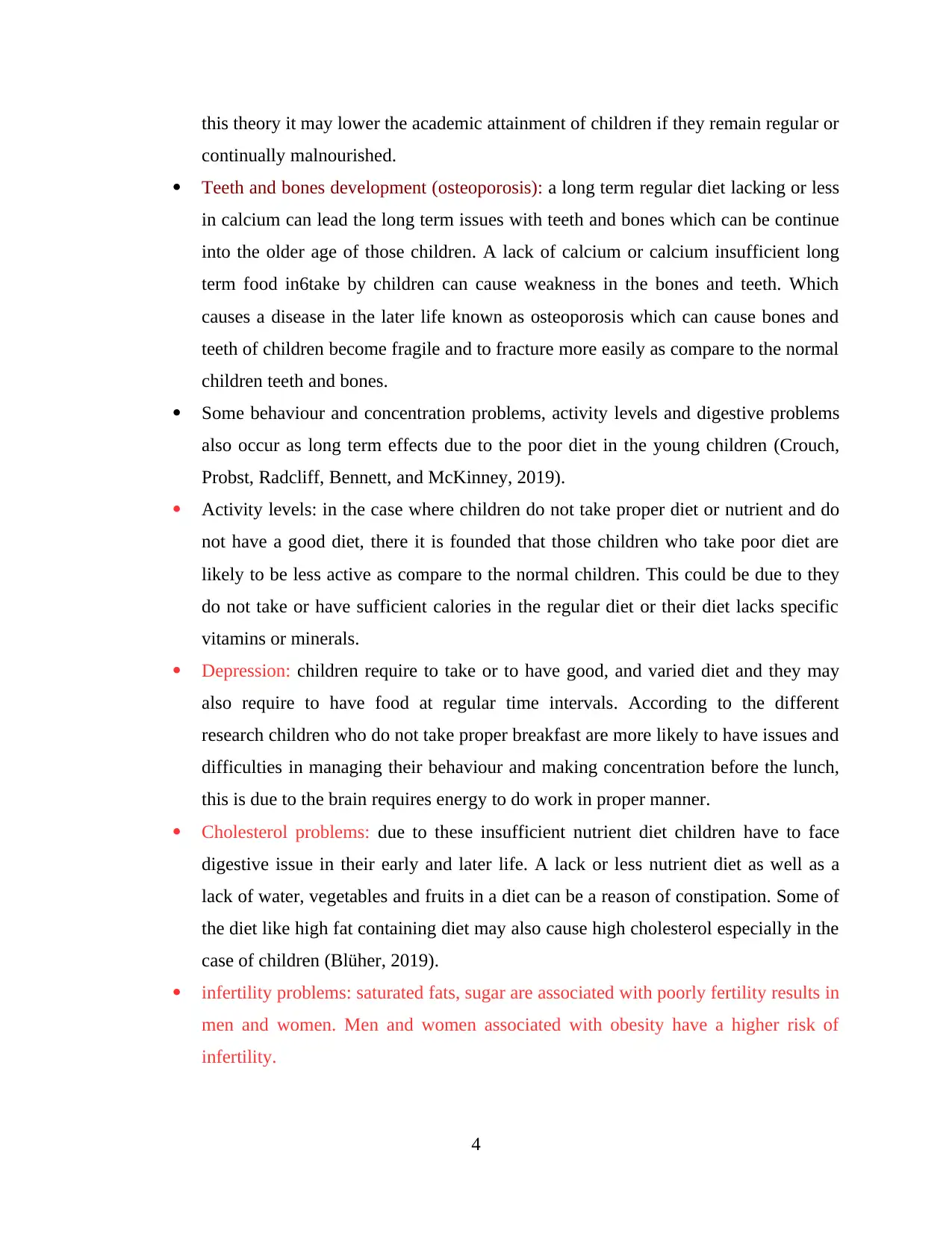
this theory it may lower the academic attainment of children if they remain regular or
continually malnourished.
Teeth and bones development (osteoporosis): a long term regular diet lacking or less
in calcium can lead the long term issues with teeth and bones which can be continue
into the older age of those children. A lack of calcium or calcium insufficient long
term food in6take by children can cause weakness in the bones and teeth. Which
causes a disease in the later life known as osteoporosis which can cause bones and
teeth of children become fragile and to fracture more easily as compare to the normal
children teeth and bones.
Some behaviour and concentration problems, activity levels and digestive problems
also occur as long term effects due to the poor diet in the young children (Crouch,
Probst, Radcliff, Bennett, and McKinney, 2019).
Activity levels: in the case where children do not take proper diet or nutrient and do
not have a good diet, there it is founded that those children who take poor diet are
likely to be less active as compare to the normal children. This could be due to they
do not take or have sufficient calories in the regular diet or their diet lacks specific
vitamins or minerals.
Depression: children require to take or to have good, and varied diet and they may
also require to have food at regular time intervals. According to the different
research children who do not take proper breakfast are more likely to have issues and
difficulties in managing their behaviour and making concentration before the lunch,
this is due to the brain requires energy to do work in proper manner.
Cholesterol problems: due to these insufficient nutrient diet children have to face
digestive issue in their early and later life. A lack or less nutrient diet as well as a
lack of water, vegetables and fruits in a diet can be a reason of constipation. Some of
the diet like high fat containing diet may also cause high cholesterol especially in the
case of children (Blüher, 2019).
infertility problems: saturated fats, sugar are associated with poorly fertility results in
men and women. Men and women associated with obesity have a higher risk of
infertility.
4
continually malnourished.
Teeth and bones development (osteoporosis): a long term regular diet lacking or less
in calcium can lead the long term issues with teeth and bones which can be continue
into the older age of those children. A lack of calcium or calcium insufficient long
term food in6take by children can cause weakness in the bones and teeth. Which
causes a disease in the later life known as osteoporosis which can cause bones and
teeth of children become fragile and to fracture more easily as compare to the normal
children teeth and bones.
Some behaviour and concentration problems, activity levels and digestive problems
also occur as long term effects due to the poor diet in the young children (Crouch,
Probst, Radcliff, Bennett, and McKinney, 2019).
Activity levels: in the case where children do not take proper diet or nutrient and do
not have a good diet, there it is founded that those children who take poor diet are
likely to be less active as compare to the normal children. This could be due to they
do not take or have sufficient calories in the regular diet or their diet lacks specific
vitamins or minerals.
Depression: children require to take or to have good, and varied diet and they may
also require to have food at regular time intervals. According to the different
research children who do not take proper breakfast are more likely to have issues and
difficulties in managing their behaviour and making concentration before the lunch,
this is due to the brain requires energy to do work in proper manner.
Cholesterol problems: due to these insufficient nutrient diet children have to face
digestive issue in their early and later life. A lack or less nutrient diet as well as a
lack of water, vegetables and fruits in a diet can be a reason of constipation. Some of
the diet like high fat containing diet may also cause high cholesterol especially in the
case of children (Blüher, 2019).
infertility problems: saturated fats, sugar are associated with poorly fertility results in
men and women. Men and women associated with obesity have a higher risk of
infertility.
4
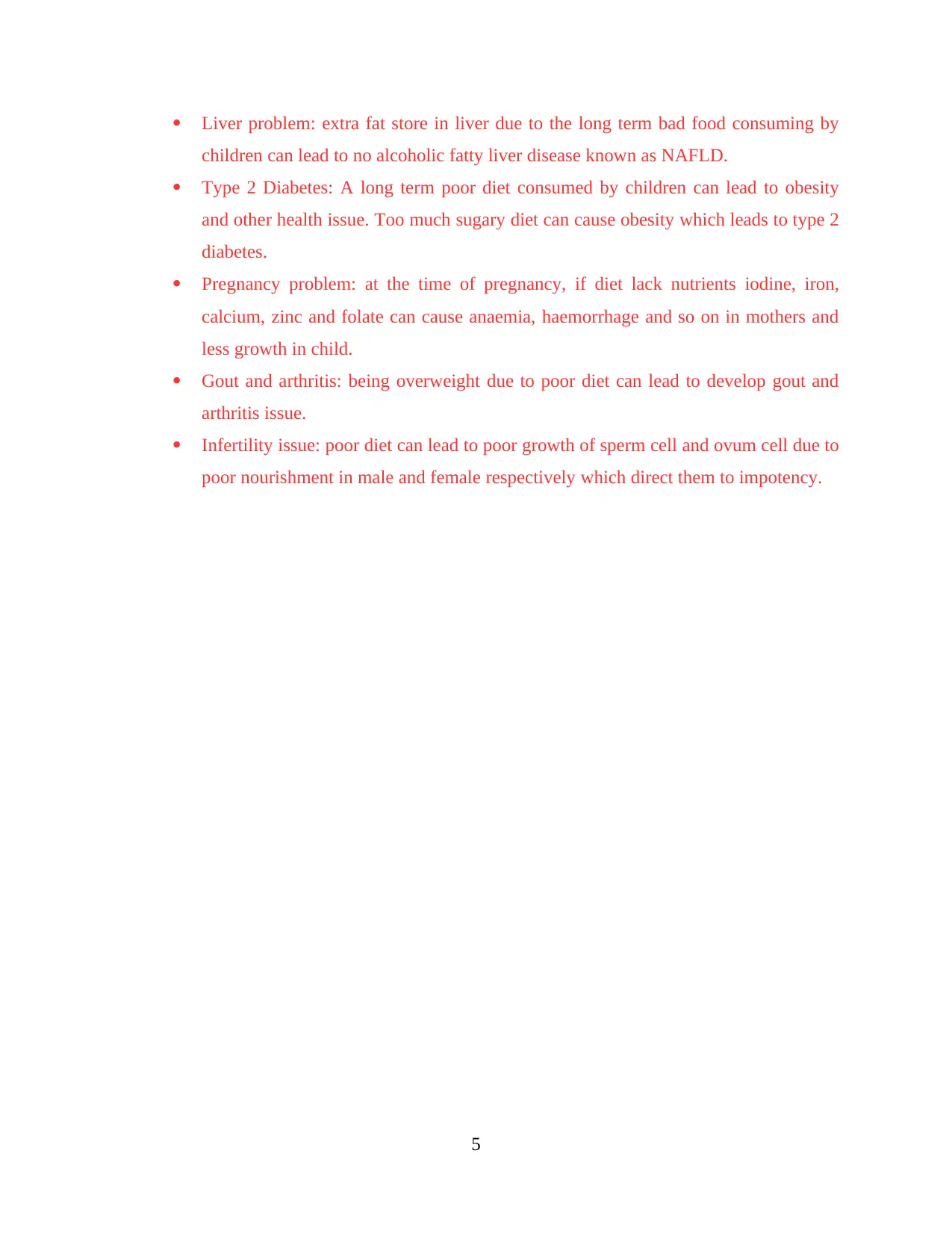
Liver problem: extra fat store in liver due to the long term bad food consuming by
children can lead to no alcoholic fatty liver disease known as NAFLD.
Type 2 Diabetes: A long term poor diet consumed by children can lead to obesity
and other health issue. Too much sugary diet can cause obesity which leads to type 2
diabetes.
Pregnancy problem: at the time of pregnancy, if diet lack nutrients iodine, iron,
calcium, zinc and folate can cause anaemia, haemorrhage and so on in mothers and
less growth in child.
Gout and arthritis: being overweight due to poor diet can lead to develop gout and
arthritis issue.
Infertility issue: poor diet can lead to poor growth of sperm cell and ovum cell due to
poor nourishment in male and female respectively which direct them to impotency.
5
children can lead to no alcoholic fatty liver disease known as NAFLD.
Type 2 Diabetes: A long term poor diet consumed by children can lead to obesity
and other health issue. Too much sugary diet can cause obesity which leads to type 2
diabetes.
Pregnancy problem: at the time of pregnancy, if diet lack nutrients iodine, iron,
calcium, zinc and folate can cause anaemia, haemorrhage and so on in mothers and
less growth in child.
Gout and arthritis: being overweight due to poor diet can lead to develop gout and
arthritis issue.
Infertility issue: poor diet can lead to poor growth of sperm cell and ovum cell due to
poor nourishment in male and female respectively which direct them to impotency.
5
Paraphrase This Document
Need a fresh take? Get an instant paraphrase of this document with our AI Paraphraser
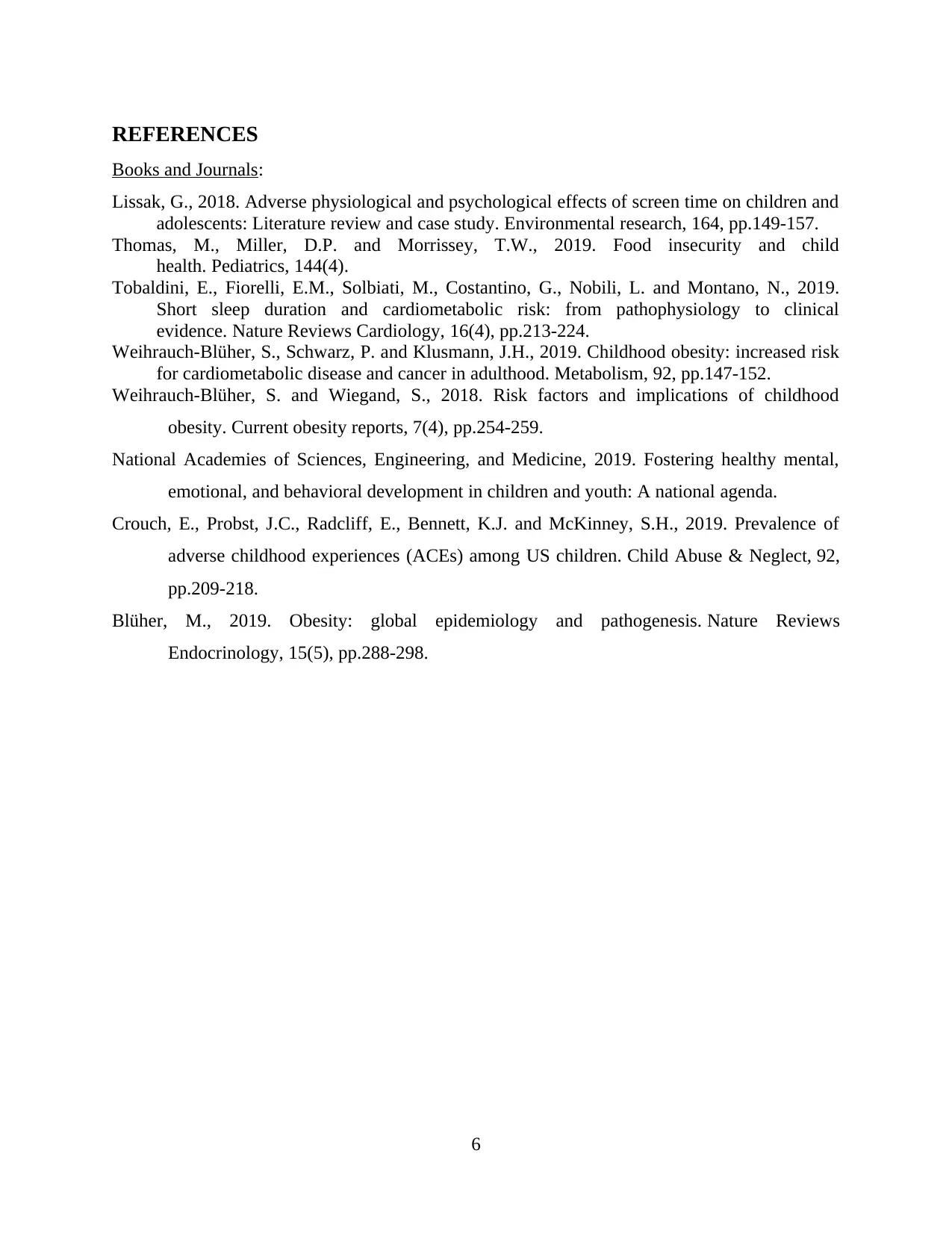
REFERENCES
Books and Journals:
Lissak, G., 2018. Adverse physiological and psychological effects of screen time on children and
adolescents: Literature review and case study. Environmental research, 164, pp.149-157.
Thomas, M., Miller, D.P. and Morrissey, T.W., 2019. Food insecurity and child
health. Pediatrics, 144(4).
Tobaldini, E., Fiorelli, E.M., Solbiati, M., Costantino, G., Nobili, L. and Montano, N., 2019.
Short sleep duration and cardiometabolic risk: from pathophysiology to clinical
evidence. Nature Reviews Cardiology, 16(4), pp.213-224.
Weihrauch-Blüher, S., Schwarz, P. and Klusmann, J.H., 2019. Childhood obesity: increased risk
for cardiometabolic disease and cancer in adulthood. Metabolism, 92, pp.147-152.
Weihrauch-Blüher, S. and Wiegand, S., 2018. Risk factors and implications of childhood
obesity. Current obesity reports, 7(4), pp.254-259.
National Academies of Sciences, Engineering, and Medicine, 2019. Fostering healthy mental,
emotional, and behavioral development in children and youth: A national agenda.
Crouch, E., Probst, J.C., Radcliff, E., Bennett, K.J. and McKinney, S.H., 2019. Prevalence of
adverse childhood experiences (ACEs) among US children. Child Abuse & Neglect, 92,
pp.209-218.
Blüher, M., 2019. Obesity: global epidemiology and pathogenesis. Nature Reviews
Endocrinology, 15(5), pp.288-298.
6
Books and Journals:
Lissak, G., 2018. Adverse physiological and psychological effects of screen time on children and
adolescents: Literature review and case study. Environmental research, 164, pp.149-157.
Thomas, M., Miller, D.P. and Morrissey, T.W., 2019. Food insecurity and child
health. Pediatrics, 144(4).
Tobaldini, E., Fiorelli, E.M., Solbiati, M., Costantino, G., Nobili, L. and Montano, N., 2019.
Short sleep duration and cardiometabolic risk: from pathophysiology to clinical
evidence. Nature Reviews Cardiology, 16(4), pp.213-224.
Weihrauch-Blüher, S., Schwarz, P. and Klusmann, J.H., 2019. Childhood obesity: increased risk
for cardiometabolic disease and cancer in adulthood. Metabolism, 92, pp.147-152.
Weihrauch-Blüher, S. and Wiegand, S., 2018. Risk factors and implications of childhood
obesity. Current obesity reports, 7(4), pp.254-259.
National Academies of Sciences, Engineering, and Medicine, 2019. Fostering healthy mental,
emotional, and behavioral development in children and youth: A national agenda.
Crouch, E., Probst, J.C., Radcliff, E., Bennett, K.J. and McKinney, S.H., 2019. Prevalence of
adverse childhood experiences (ACEs) among US children. Child Abuse & Neglect, 92,
pp.209-218.
Blüher, M., 2019. Obesity: global epidemiology and pathogenesis. Nature Reviews
Endocrinology, 15(5), pp.288-298.
6
1 out of 8
Related Documents
Your All-in-One AI-Powered Toolkit for Academic Success.
+13062052269
info@desklib.com
Available 24*7 on WhatsApp / Email
![[object Object]](/_next/static/media/star-bottom.7253800d.svg)
Unlock your academic potential
© 2024 | Zucol Services PVT LTD | All rights reserved.





